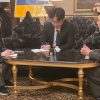Comment by Alyona Getmanchuk for “The Washington Post”.
Correction: An earlier version of this story incorrectly stated that John E. Herbst served as U.S. ambassador to Ukraine from 2006 to 2009. He served from 2003 to 2006.
After trading some political pleasantries with Ukraine’s new leader, President Trump began to make his case that the United States was an indispensable friend.
“We do a lot for Ukraine,” Trump told Ukrainian President Volodymyr Zelensky in a July 25 call, according to a rough transcript made public by the White House on Wednesday.
Trump gave no specifics of the United States’ assistance in the call, but went on to bash European allies — and Germany’s Angela Merkel in particular — as not doing enough to aid Ukraine.
But now the entire U.S. aid package to Ukraine — almost $400 million — has become a key exhibit in possible impeachment probes. On Tuesday, Trump acknowledged he ordered the aid withheld during the summer before making the July call with Zelensky, who was encouraged by Trump to work with the U.S. attorney general to investigate Democratic presidential candidate Joe Biden.
[Trump ordered hold on military aid days before calling Ukrainian president, officials say]
Since the early 1990s, after the fall of the Soviet Union, the United States has consistently supplied foreign aid to Ukraine, partly to foster the pro-Western political and military links in a key country bordering Russia.
“Our efforts have been designed to promote stability, to protect the integrity and sovereignty of Ukraine, and to help it reform,” said John E. Herbst, who served as U.S. ambassador to Ukraine from 2003 to 2006 and is the director of the Eurasia Center at the Atlantic Council.
Although the United States is one of the country’s biggest foreign-aid benefactors, other countries have also sent significant assistance to Ukraine.
The European Union and its financial institutions have provided more than $16.5 billion in grants and loans to support its reform process since 2014. In addition to those E.U. funds, Germany on its own has pledged millions of dollars in assistance, as has Britain. And Japan, meanwhile, has given $3.1 billion in assistance to Ukraine to the establishment of diplomatic relations in the early 1990s.
In 2014, after Russia annexed the region of Crimea and sparked war in Ukraine’s east, Congress enthusiastically passed legislation that imposed sanctions on Russia and increased ongoing military assistance to Ukraine. The money has provided cybersecurity and intelligence support, as well as training and equipment, to the country’s armed forces.
Speaking to reporters Tuesday, Trump said he had withheld aid — which was eventually released on Sept. 11 after lawmakers raised concerns — and would do it again “until such time as Europe and other nations contribute to Ukraine because they’re not doing it.”
In a White House released transcript of the July call between Trump and Zelensky, both leaders complain about European countries, singling out Germany, for not doing enough to help Ukraine — though it was not clear they were specifically discussing financial assistance.
“Germany does almost nothing for you,” Trump said to Zelensky, according to the transcript. “All they do is talk and I think it’s something that you should really ask them about. When I was speaking to Angela Merkel she talks Ukraine, but she doesn’t do anything.”
Zelensky told Trump he had met with the German chancellor as well as French President Emmanuel Macron and told them that they were not enforcing sanctions against Russia and “not working as much as they should work for Ukraine.”
U.S. assistance (and the threat of withholding it) has played a role in efforts to root out corruption and promote transparency in a country that has long grappled with cronyism.
Viktor Yanukovych, the country’s notoriously corrupt president from 2010 to 2014, was convicted of treason by a Ukrainian court and sentenced in absentia in January to 13 years in prison. While in power, Yanukovych was widely seen as a pro-Russian puppet: The court ruled that he called on Russian President Vladimir Putin to invade Ukraine and that he violently quashed pro-Western democracy protests in Kiev.
While the protests eventually led to Yanukovych’s ouster, corruption in Ukraine remains a problem. The country scored 32 out of 100 on Transparency International’s 2018 corruption perceptions index. Zelensky, a television comedian with no prior political experience, won the presidency in part by promising to tackle corruption.
The United States has in the past expressed concern about increasing security aid to the country because of graft.
[The full Trump-Ukraine timeline — as of now]
“We got used to assistance becoming more and more conditional,” said Alyona Getmanchuk, director of the New Europe Center, a Kiev-based think tank. But she noted that conditions imposed in the past were about “helping Ukraine move forward and reform itself” — including encouraging the Kiev government to provide more transparency or adopt new national security measures that would further integrate it with the United States and NATO.
Thanks in part to the United States, Ukraine three weeks ago launched an anti-corruption court that aims to deal with high-level and political graft, Getmanchuk said.
But Trump’s alleged request to Zelensky, which he has denied, makes the prospect of future U.S. aid more worrying, she said.
“If those conditions are directed at making Ukraine a subject of an internal political fight, that’s not a good sign,” she said. “That’s why I’m concerned.”
Analysts worry that if Trump was acting with the investigation of his political rival in mind, the ramifications could affect Ukraine’s other bilateral relations.
The concern in Kiev could be that if it is seen as overtly cooperating with the president’s demands to launch an investigation, “another country could also seek to undermine Ukrainian ties,” said Mark D. Simakovsky, a senior fellow at the Atlantic Council.
“Politicizing assistance to Ukraine is very dangerous, because it will ultimately erode Ukraine’s assistance and independence at a time when it needs the United States most,” he said.
“Ukraine, unfortunately, is in the president’s crosshairs,” he added.







